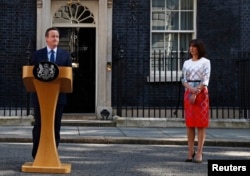The historic Brexit will leave the U.S. without one of its most closely aligned allies in the European Union and could prompt it to seek a rebalance with other countries in the 28-member bloc.
Britain’s decision to cut ties with the EU is “bad for the United States,” said Council on Foreign Relations President Richard Haass.
He said in the Belgium-based EU, Britain has had a “voice” that parallels U.S. views and interests on many issues.
“People such as myself are somewhat concerned that without the U.K. sitting at the table in Brussels, some of the debates could come out differently,” Haass said in a Friday forum.
Britain’s breakup with the EU will leave it poorer and possibly more fractured, especially if the decision prompts Scotland to seek independence from Britain, analysts say. They added the internal instability could distract Britain from engaging in broader foreign policy issues.
However, while some analysts disagree that Brexit will significantly shake U.S. influence in the EU, they say the relationships may need to change.
May have to 'rebalance'
While the U.S. has had a close relationship with the EU and its individual states, it may now have to “rebalance” its approach within Europe, said Jeff Rathke, deputy director of the Europe Program at the Center for Strategic and International Studies.
“In other words, to engage with other EU member states more on EU issues than it has done in the past,” said Rathke, a former State Department spokesman.
But he said this would not be an entirely new approach for the United States.
“There was never a situation where the U.S. talked only to Britain, and did not talk to France, Germany, Italy, Spain, Poland or whoever else about issues that were up for discussion in the European Union,” Rathke said.
The U.S. has enjoyed broad cooperation with Britain on trade and finance issues as well as sharing military intelligence.
The two countries have also closely collaborated on major foreign policy and security initiatives, such as the Iran nuclear deal and ongoing efforts to help stabilize Syria.
'Relationship with Europe'
There may be implications for Britain’s relationship with the United States, said Michael O'Hanlon, a Brookings Institution foreign policy analyst. But he said that was not the focus of voters in Britain.
“The vote itself I don’t view as reflecting any British decision to change its relationship with the United States," O'Hanlon said. "It was a decision to change the relationship with Europe."
At the State Department, spokesman John Kirby disagreed with sentiment that Brexit could set back U.S.-British relations.
“We do not believe that the relationship with the U.K. will remain anything other than special and strong and deep and abiding,” Kirby said.
He added that Secretary of State John Kerry had discussed the referendum with his British counterpart, Foreign Secretary Philip Hammond, earlier on Friday.
"I want to emphasize that although the U.K. will be leaving the European Union, the British are in no way departing from the principles and values that undergird the Transatlantic Partnership or from the important role the U.K. plays in promoting peace and stability in the world," Kerry said in a statement later Friday. "The special relationship that has long existed between the United States and the U.K. endures."






